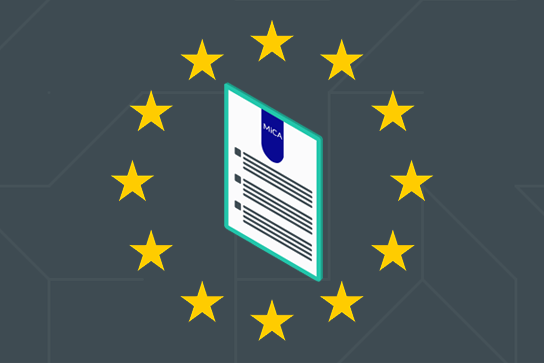
Does MiCA Impact Crypto Asset Service Providers (CASPs)?
In short - yes, the Markets in Crypto Assets (MiCA) framework impacts crypto asset service providers (CASPs). But before we discuss the hows and whys, let’s recap what MiCA is and a few other MiCA quintessential definitions.
Does MiCA Impact Crypto Asset Service Providers (CASPs)?
MiCA Is Not the Transfer of Funds Regulation (TFR)
On 5 October 2022, the European Union agreed upon the final version of the MiCA framework. MiCA, similar to the Markets in Financial Instruments Directive, regulates centralised entities such as CASPs and issuers of stablecoins. Additionally, it forms part of the holistic regulation framework - the EU Digital Finance framework - and makes reference to the following frameworks, amongst others:
The Transfer of Funds Regulation (TFR),
The AML Package (AMLR, AMLD6 and AMLA),
The Markets in Financial Instruments Directive (MiFID II),
The E-money Directive.
To clarify, MiCA differs from the Transfer of Funds Regulation (TFR). The TFR is the EU’s implementation of the Travel Rule. MiCA does not impose a minimum threshold for transfers between accounts, and self-hosted wallet (unhosted wallet) transfers will not fall into its scope - this falls under the TFR. MiCA does not cover DeFi and DAOs, nor includes non-fungible tokens (NFTs) or the borrowing and lending of crypto assets (virtual assets).
The MiCA framework aims to provide a level playing field for financial institutions and CASPs across the EU. Through its uniform approach, actors within the ecosystem can expect an additional layer of protection and equality.
Stablecoins According to MiCA
One of MiCA’s roles is to provide specific definitions to concepts not already defined or recognised by existing EU policies and frameworks. A prime example of this is MiCA’s take on stablecoins. In line with Consideration 8, MiCA has provided specific definitions for Electronic Money Tokens (EMTs) and Asset Referenced Tokens (ARTs), traditionally referred to as stablecoins.
Find out more about EMTs and ARTs.
Virtual Asset Service Providers According to MiCA
Another essential definition provided by MiCA is that of a CASP. MiCA has embellished upon the FATF’s existing definition of a virtual asset service provider (VASP) to create its own. MiCA’s definition aimed to include existing markets, as well as make room for markets that don’t yet exist. When comparing the FATF’s and MiCA’s definitions, one will see that MiCA’s definition is future-proof and more inclusive.
Find out more about CASPs and VASPs.
What Is a CASP According to MiCA?
As per Article 3, MiCA defines a CASP as a provider of any of the below services or activities when related to any crypto asset:
the custody and administration of crypto assets on behalf of third parties;
the operation of a trading platform for crypto assets;
the exchange of crypto assets for fiat currency that is legal tender;
the exchange of crypto assets for other crypto assets;
the execution of orders for crypto assets on behalf of third parties;
placing of crypto assets;
the reception and transmission of orders for crypto assets on behalf of third parties;
providing advice on crypto assets.
According to MiCA, a provider can be:
a person whose occupation it is to provide these services to a third party on a professional basis, or
a business which provides these services to a third party on a professional basis.
Does MiCA Impact Crypto Asset Service Providers?
Yes, it does. CASPs providing their services within the EU are subject to the MiCA regulation. Simply put, MiCA is a list of regulatory standards CASPs operating in the EU must implement.
With MiCA, CASPs must fulfil certain checks before they are legally allowed to operate within the EU. Examples of these requirements include CASPs having to:
meet minimum capital requirements,
receive prior authorisation from the relevant member state government, Article 63 (this excludes companies already authorised by the MiFID),
adhere to additional regulatory criteria, i.e. Article 70: Safekeeping of clients’ crypto-assets and funds or Governance requirements.
The above list is a sample of what is required from CASPs; please see the complete MiCA document for a complete breakdown of requirements.
Does MiCA Impact Non-European Crypto Asset Service Providers?
MiCA is a European framework and applies to all entities offering tokens or services within Europe. Moreover, for a foreign CASP to provide services within Europe, it will need to be established in the EU to obtain the relevant authorisation and therefore comply with MiCA regulation.
The Official Journal’s version of the MiCA document will be published by April 2023 and come into force 20 days thereafter. CASPs will have 18 months to comply with the estimated October 2024 deadline.
Foreign CASPs should become acquainted with MiCA’s requirements to ensure continued business within the EU.
In Parting
The MiCA document may seem overwhelming at first glance, but the trickiest part of complying with MiCA’s standards is understanding exactly what kind of services your business offers. Once you have determined that, you will be able to see what applies and doesn’t apply to your business.
If this is your first time with compliance, we recommend getting an expert opinion to ensure that you meet MiCA’s standards stress-free, and without hindering your business. Moreover, despite the “distant” deadline, now is the time to familiarise your business with MiCA.
Unsure of where to start? Reach out to us. One of our experts will point you in the right direction.



